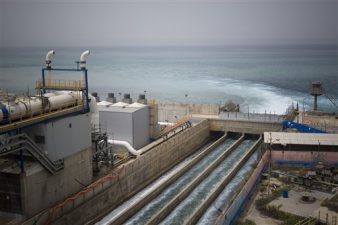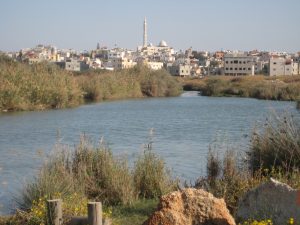 Yosef explores Paul Klugman’s environmental economics essay in the NY Times. Klugman and Gore’s words, Yosef finds, may influence decision-makers to slow the gallop toward environmental ruin in the Middle East. Above image of Klugman
Yosef explores Paul Klugman’s environmental economics essay in the NY Times. Klugman and Gore’s words, Yosef finds, may influence decision-makers to slow the gallop toward environmental ruin in the Middle East. Above image of Klugman
We greens of the Middle East have to take our manna from whence it comes – even if its from liberal economists: In a two-part series appearing on the editorial opinion pages of the April 13 and April 14, 2010 issues of the International Herald Tribune, Nobel Prize winning Princeton University economist Paul Krugman makes the case for potent economic measures aimed at limiting greenhouse gas emissions.
In the April 14th piece he writes: “Current predictions of global warming in the absence of action are just too close to the kinds of numbers associated with doomsday scenarios. It would be irresponsible – it’s tempting to say criminally irresponsible – not to step back from what could all too easily turn out to be the edge of a cliff.”
For those of us who have reached these conclusions without being Nobelists, Krugman’s words offer little insight. However, Krugman stands on the Olympian heights of liberal economics: He has served as a consultant to the Federal Reserve Bank of New York, the World Bank, the International Monetary Fund, the United Nations, as well as to a number of countries including Portugal and the Philippines. He has been a member of the US President Council of Economic Advisors.
Paul Krugman’s commentary is another clarion call (see my post on Gore’s Clarion Call) by mainstream figures for action aimed at limiting devastating greenhouse gas emissions. Coming from someone who champions the system responsible for global environmental degradation, Krugman’s reasoning that “risk of catastrophe makes the most powerful case for strong climate policy,” is meaningful and is unlikely to be ignored by policy-makers whom he counsels.
In his articles Krugman considers the various contemporary liberal positions with special reference to Pigovian theory, a form of analysis named after an early 20th century British economist Arthur Cecil Pigou. Pigou dealt with the question of externalities, phenomena like education (a positive externality) and pollution (a negative one) that are not directly tied to the economic production and productivity.
Briefly, Pigou believed that one should subsidize firms that promote positive externalities and tax those engaged in negative ones. In the contemporary context, this involves an attempt to stem greenhouse gas emissions by making those who produce them economically responsible through taxes, fees or the cap-and-trade system of carbon credit exchange.
Krugman reviews the work of contemporary economists such as Yale University’s William Nordhaus, Harvard’s Martin Weitzman and the London School of Economics’ Nicholas Stern who have written scholarly analysis on the economic impact of climate change and measures aimed at limiting it.
These economists argue that “[r]estricting emissions would slow economic growth – but not by much.” In liberal economics-speak, the position suggests that containing emissions is cheaper than leaving the problem untreated. This is all the more the case given, as Weitzman believes (and Krugman with him) that “[i]t’s the non-negligible probability of utter disaster that should dominate our policy analysis. And that argues for aggressive motives to curb emissions, soon.” as stated by the columnist in the April 14th article.
Both of Krugman’s articles appear under the headline “Green Economics,” with the April 14th item having the extended heading, “Green Economics: The Cost of Inaction.” As a liberal economist, Krugman is concerned with costs and prices and he advocates the trade-based measures that has been a mainstay of environmentally-concerned policy makers in the affluent countries.
However, as the debacle at the Copenhagen climate change conference and summit last December demonstrated, these countries are unable to forge an agreement for reforms that would significantly prevent the “non-negligible probability of utter disaster” that climate change involves.
Globally, and in the US in particular where there is a laudable effort by a cross-partisan group of senators (Jon Kerry, Joe Lieberman and Lindsey Graham, representing Democratic, Independent and Republican positions, respectively) to push cap-and-trade limitations on greenhouse gas emissions, Krugman writes that “[t]he immediate prospects for climate action do not look promising.”
As pleased as greens might be the advocacy of Nobelists like Al Gore and Paul Krugman for limiting atmospheric carbon, the real problem leading to environmental degradation is the one they are not willing to name: the economic hyper-growth produced by the (more-or-less) free market system. A system that has made it safe for market forces to have free reign on planetary resources and the global commons is inherently unable to safeguard the environment. The same system that continues to produce sharp social discrepancies within and between societies and that has built great wealth in some countries based on the resource transfer from lands made poorer in the process, can be reformed to become safe for the environment only if it re-forms itself into another system — one based on providing universally for basic needs and measured growth.
In policy circles existent today from Beijing to Washington, Jerusalem and Damascus, the kind of basic economic restructuring that the global environmental crises requires gets little play.
In the Middle East, thinking that is both green and socioeconomically responsible is particularly remote. In Israel, the Netanyahu government seeks to privatize anything under the heavens (presumably air and water along with land if they only could) and to affords contractors free-reign in paving every square centimeter available.
Elsewhere in the region, hugely capital-intensive projects like the Palm Islands (in Dubai), Masdar City (Abu Dhabi), Cedar Islands (Lebanon) and Burj Khalifa (Dubai) earthworks that are profoundly dubious environmentally are being erected in the name of some grand distortion of the concept of sustainability.
In the post-Copenhagen 2009 world, Middle East greens and advocates of sustainability everywhere should localize and echo the powerful voices of the Gores and Krugmans. Right now, these voices are the closest we can get to influencing decision-makers to slow the gallop toward environmental ruin.
::NY Times
::Paul Klugman’s blog
Yosef Gotlieb, a geographer specializing in global change and international development, wrote Self-Determination in the Middle East (1982) and Development, Environment and Global Dysfunction (1996). He is on the faculty of David Yellin College, Jerusalem.



